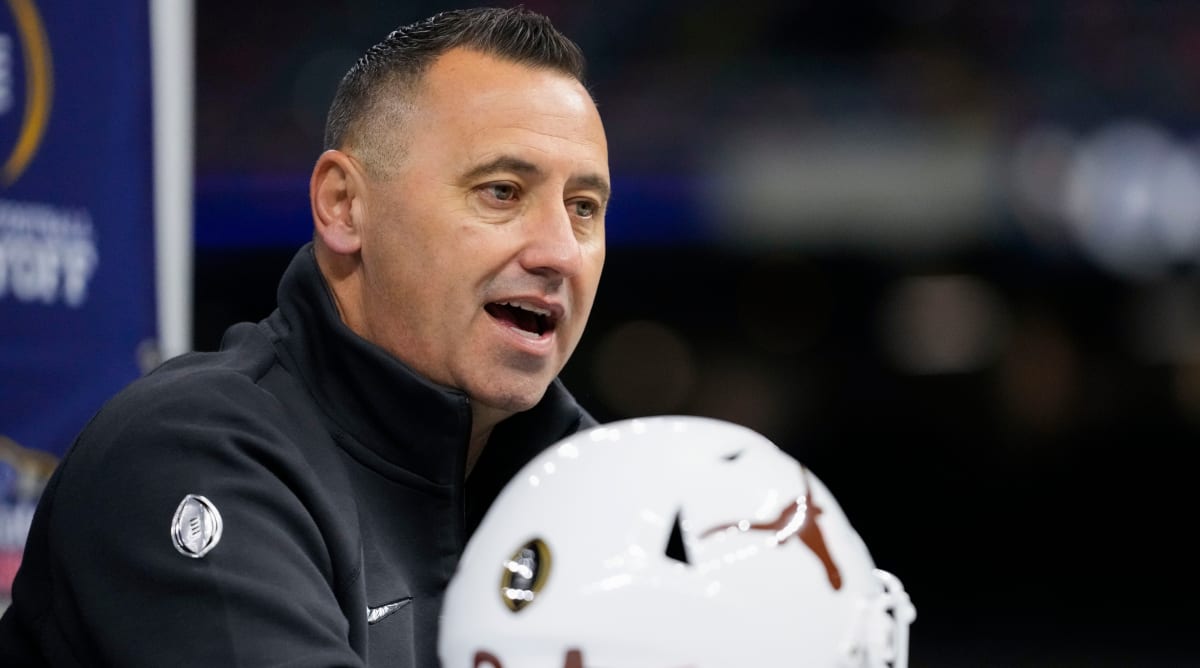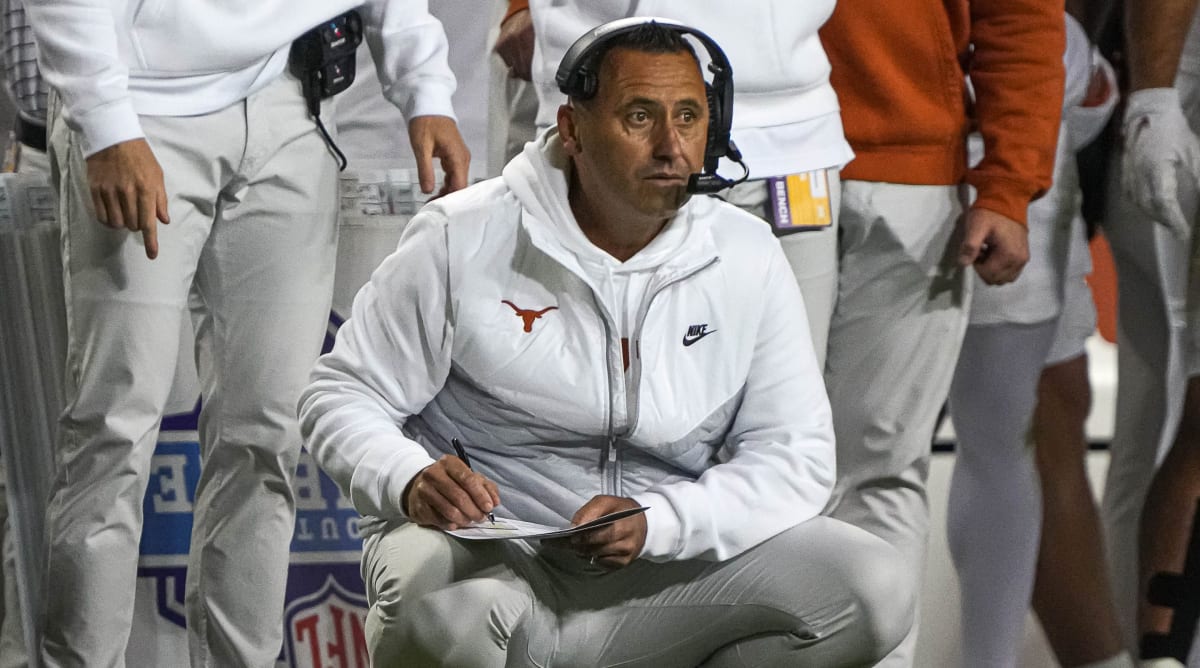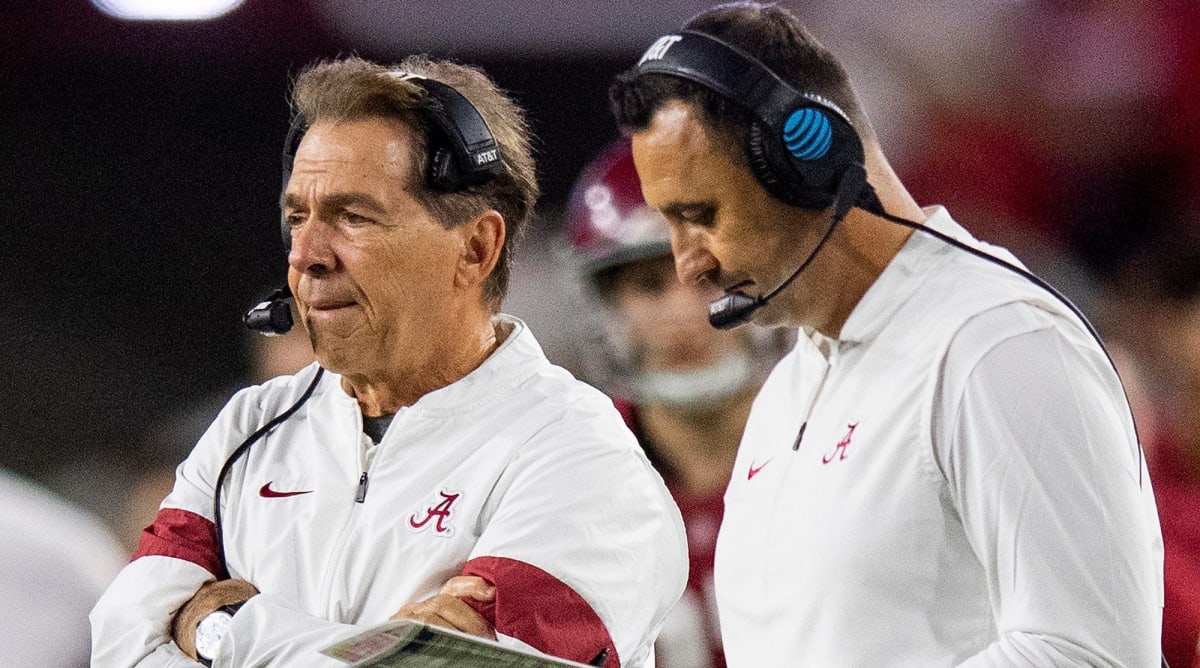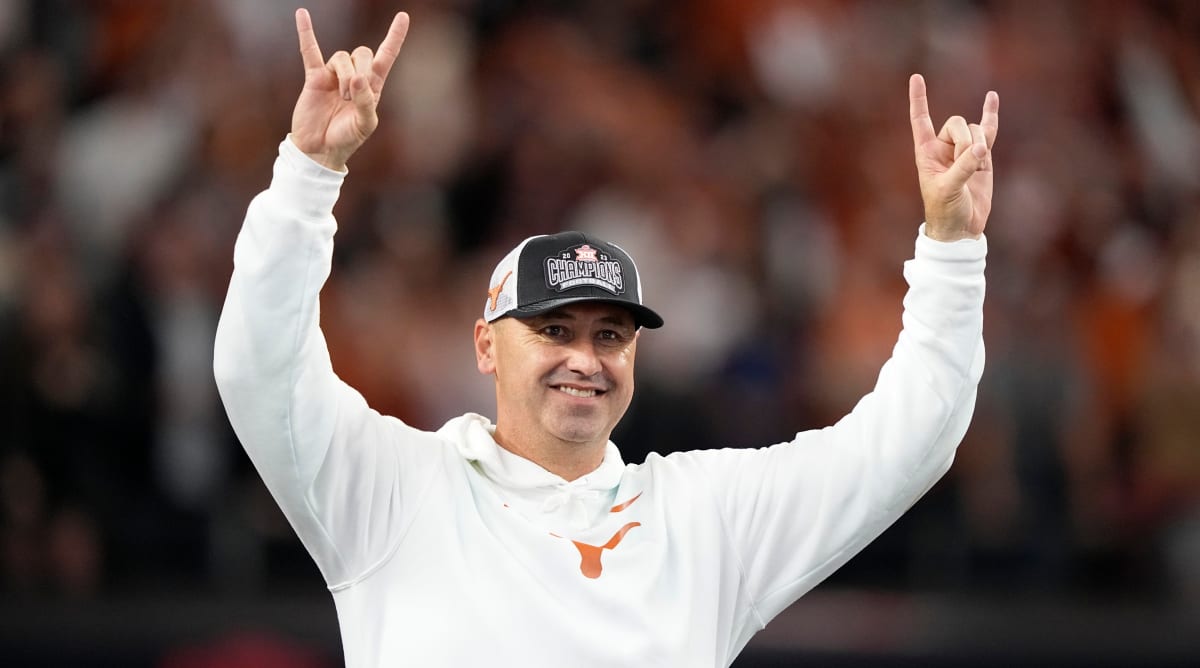The interview was where so many take place during the college football hiring season: a nondescript hotel near the Dallas Fort Worth airport, which serves as a convenient middle ground for covert meetings. The Texas contingent consisted of athletic director Chris Del Conte, president Jay Hartzell and board of regents chairman Kevin Eltife. They were there to see Alabama offensive coordinator Steve Sarkisian.
Counter to popular interview trends in the sport, Sark did not arrive armed with a binder full of detailed plans. This meeting was less about showing off his football acumen or organizational skills and more about presenting himself as a human being. “I want it to come from me and how I feel and not some book that a (graduate assistant) put together the night before the interview,” he says. “I didn’t have to flip to page 48. It was coming right out of me.”
What came out of Steve Sarkisian during that meeting was an unflinching honesty—about who he is and where he’s been and how hard he landed at rock bottom. Sark owned all of it—his firing from a dream job in 2015 at USC due to alcohol abuse, his time in rehab getting sober, a stretch where he said he couldn’t get a foot in the door for jobs—and laid it on the table for Texas to consider.
“He said, ‘I’ve lost everything,’” Del Conte recalls. “He’s very open about his own personal struggle, which allowed him to walk into the room and talk about what he’s lost and what he’s gained. He had a humility about him. Ego is the enemy. He saw the adulation and the fall, and he took ownership of it.”
Hartzell says he was struck by Sarkisian’s authenticity. “He spoke with candor about his past and optimism about his future. He came across as humble, insightful, thoughtful and genuine.”
When the interview ended, the Texas administrators were sure they had found their man. “We had to contain our excitement a little bit,” Del Conte says. “We had to go Cool Hand Luke. We couldn’t offer it to him right then so we said, ‘We’ll get back to you.’”
It didn’t take long to get back to him. Interviews with other candidates were canceled. Roughly five hours after Texas unexpectedly fired Tom Herman on Jan. 2, 2021, it announced the hiring of Sark.

Gerald Herbert/AP
Three years later, Sark will lead reborn Texas in the Sugar Bowl Monday night against the school where he had his first head-coaching job: Washington. After more than a decade of stumbling through the wilderness of mediocrity, Texas is back. That’s now a statement of fact, not a punchline mocking so many premature pronouncements since the Longhorns last contended for a national title in 2009.
To get the Horns back on top, Sark has won over his team the same way he won over the Texas brass at that DFW hotel interview. He’s opened up to his players in a manner that established a trust and a bond that supersedes his considerable coaching gifts. Sark hasn’t elevated an underachieving blueblood to 12–1 just by drawing up the best plays in the country (although he does, and that certainly helps); he’s done it by strengthening the intangibles that every winning team needs. This Texas season is a triumph of trust.
They call it Culture Wednesdays. Every week, the Longhorns do something that is meant to enhance their team culture, to get to know each other on a level deeper than football. Players are encouraged to share things like the best day of their life, the worst day, their biggest regret, biggest hero, and so forth.
But the first meeting of every season starts with Sark telling his story.
“I just wanted them to know who Steve Sarkisian was in my own words and not what they read on the Internet, not what other people wrote about who I was,” he says. “So to do that, I had to be authentic. I had to be transparent. I had to be vulnerable. I had to share things that most people probably wouldn’t share with some of their closest friends, but I had to do that to really start to gain their trust and also to give them the idea that, ‘Hey, in here, on this platform, you can be you. You can be vulnerable, and we’re here to support one another.’
“So they got my story, nuts and bolts. And it wasn’t the PG version.”
The trickle-down effect has been palpable, according to the Longhorns, especially in this third season under Sarkisian. A program that never lacked talent has gone from 5–7 to 8–5 to 12–1. After going 2–5 in one-score games last year, the Longhorns are 3–1 in those contests this year—a sign to Sark that his team has a greater belief in itself now. They’ve avenged four of their five losses from last season, and Washington will provide the opportunity for a clean sweep.
“I believe it does relate to football,” Sarkisian said. “I believe that it equates to getting a fourth-down stop against Kansas State. I believe it relates to a third-and-12 conversion against TCU. I believe it relates to a fourth-and-1 stop against Houston. In those tough moments that you can count on one another, rely on one another, that it’s not just about me. It’s about everybody doing their part.”

Aaron E. Martinez/American-Statesman/USA TODAY NETWORK
A lot of things have gone into that improvement, including the vague-but-real impact of team culture. “His ability to build a culture for the program starts with him owning his own story,” Hartzell says.
And that starts with Culture Wednesdays. When a coach decided to lead by humbling himself in front of his players, that encouraged them to do the same.
“The idea is to understand your teammate beside the helmet, besides he plays running back, he plays linebacker,” says offensive tackle Christian Jones. “You understand their background, where they’re coming from, how to approach a person. It brought everyone closer.
“We all just get very vulnerable. That’s something I don’t think men do a lot. At first it’s a little weird … but then people actually buy in and you see the benefits of it.”
The hiring of Steve Sarkisian did not come without blowback. A Cadillac program had selected a dented retread.
Texas once took a serious swing at swiping Nick Saban from Alabama, and now it was settling for one of his assistants? The Longhorns hadn’t hired someone directly from an assistant role since 1951. Sark’s record at Washington and USC was good, not great—he was 46–35 overall, and never won a Pac-12 conference or divisional title. Then there was the personal baggage.
After Mack Brown lost momentum, Charlie Strong failed to record a winning record in three seasons and Herman couldn’t get the Longhorns over the hump, the school really couldn’t afford another bad hire.
“It was a risk,” Del Conte conceded.
But in addition to the human connection Sark made in the interview, he had some other strong elements in his favor. He understood what it took to succeed in one of the biggest jobs in the sport, and he arrived at the peak of his schematic powers.
Del Conte said he met with another coaching candidate he did not name who has had a successful career. But the coach described himself as more of a “Cleveland Indians guy than a New York Yankees guy.” That was a disqualifier.
“We are a New York Yankees kind of program,” Del Conte says. “In the story of David and Goliath, we are Goliath. Sports is built on Davids, and those are great stories, but we are never going to be David.
“You have to know how to operate in a place like this. You have to navigate an aircraft carrier. Everyone can drive a boat, but this is an aircraft carrier—still a boat, but a different boat.”

Mickey Welsh/Montgomery Advertiser/USA TODAY NETWORK
Sark saw two of the best aircraft-carrier navigators ever up close in Pete Carroll at USC and Saban at Alabama. He was comfortable at a program of stature and had the requisite self-confidence to believe the Texas job wasn’t too big for him.
And he brought along his fertile offensive mind from Alabama after orchestrating what statistically are the two greatest offenses in Crimson Tide history—with two different quarterbacks. The 2019 Tide averaged 47.2 points and 511 yards per game with Tua Tagovailoa at QB, then the undefeated 2020 team upped those numbers to 48.5 points and 542 yards per game with Mac Jones.
“I think he’s the best play-caller that I certainly have ever worked with and I think maybe the top play-caller in all of football right now,” says Longhorns offensive coordinator and line coach Kyle Flood, who worked with Sark at the Atlanta Falcons and Alabama before joining his staff at Texas. “I think what makes him that is his ability to see the game in real time. It’s not just about the game plan and what we’ve looked at on film. I think as the game is happening and as the teams that we’re playing are adjusting, he’s adjusting with them. And I think that makes him unique, his ability to do that at a really high level.”
A lot of high-level play-callers can script an effective start to a game, dialing up 10-to-15 plays that stand a good chance of succeeding based on film study and practice reps. Sark can certainly do that—but Texas’s passing numbers this season hint at his in-game acumen.
Texas’s most efficient quarter throwing the football is the fourth, with a rating of 177.28. Its next most efficient is the third at 157.56, followed by the first (156.38) and then the second (140.25). When the scripted plays run out, the Horns keep moving. When defenses counter what Texas is doing, Sark usually has a counter for their counter—perhaps even several of them.
“He’s amazing,” says ESPN analyst Greg McElroy, a former Alabama quarterback. “He’s a mad scientist. I think there’s two play-callers right now in college football that are above everybody else—Steve Sarkisian and Mike Norvell at Florida State.”
McElroy touted Sark’s acumen in two particular areas: using pre-snap motion and shifts to create advantageous matchups, and having the ability to run a variety of plays out of the same formations.
“Sark in particular, he understands what the defensive adjustments will be when (the offense) shifts and motions,” McElroy says. “He understands that this wide receiver—let’s just say Xavier Worthy—he’s really good on a double move. He’s excellent in catch-and-run, but what we really want to do is involve him with this safety who is more of a run stopper. So if I motion him out of the backfield to a stack on the outside, the safety is going to cover him. So I am going to get whatever route that safety struggles with the most run by our best route-runner in a one-on-one situation.
“One thing he also does is he marries up the run with the pass, which I think is a lost art. Every run play looks like their play-action (pass) play. So they start with the run. Then, do we have the look we like for the pass? Perfect. We’ll run the pass next. Now that they’ve seen the run and the pass out of that specific look, OK, here comes the screen. Which is the curve ball. His game plan is layered. Here’s what we’re doing first, here’s what we’re doing second, here’s our changeup off of that, then we have an additional changeup.”
Sark’s mad-scientist system has helped him land top talent at quarterback. Native Texan Quinn Ewers, who was the No. 1 QB in the country in the class of 2021, enrolled early at Ohio State but then transferred back home and has started the past two seasons for the Longhorns. Meanwhile, Sark also landed the No. 1 QB for the ‘23 class, Arch Manning—scion of America’s greatest QB family. Manning is redshirting this season but has been elevated to Ewers’s backup after No. 2 QB Maalik Murphy entered the transfer portal.
But unlike some head coaches who are offensive experts, Sark has devoted considerable time to building a complete program. Upon arrival, he realized the Horns didn’t have championship-level line play and set about changing that on both sides of the ball. As a result? Texas has signed 18 offensive or defensive linemen rated four-star or five-star prospects in the last three recruiting cycles. The Horns are no longer considered soft at the point of attack.
Realizing that championships aren’t won by simply trying to outscore opponents, Sark has also turned the Horns into a much better defensive team. Their yards allowed per play last year (4.94) and this year (5.04) are the lowest for Texas since 2014. Their points allowed per game (17.5) are the fewest since the ‘09 team went 13–1 and played in the BCS championship game.

Tony Gutierrez/AP
In sum, Texas has been built into a program that not only is contending for the 2023 national championship, but is well-positioned to enter the Southeastern Conference in ’24. That was very much in doubt before this breakthrough season, but not anymore.
“It looks like it’s lined up right,” Hartzell says. “We went into that coaching search (in 2020–21) thinking a conference change could happen. We didn’t discuss it with any candidates, but we were thinking, ‘What is the kind of coach that could lead us in a new direction?’”
They hired a guy who could never have seen this coming just a few years ago.
On the eve of the Sugar Bowl, Steve Sarkisian was asked if, during the dark days of 2015, he doubted he would ever be in position to lead a team into a playoff semifinal game. The answer was another candid window into a man whose accumulated scar tissue has made him better and wiser.
“Hell, yeah, I did,” Sark says. “Geez. I was out of work. Couldn’t get an interview, never mind a job, never mind thinking about the College Football Playoff. Sure, it did. I think that’s what makes part of this journey with this team this year probably so gratifying.
“So I think part of that puts things into perspective in that you appreciate the opportunities that you get. You appreciate the people that you’re around every day. And you try to pour into those people. And when you pour into them, sometimes you get results like this, and you get on teams like this, and you get to be part of special seasons like this.
“So it’s fascinating to think of the journey that me personally, that I’ve been on, to get to this point. But I’m hopeful that my story can serve as some sort of motivation to others. We don’t have to stay where we are in life. If we have our goals set on something and we live a life of doing things the right way and do the next right thing and treat people well and work hard; be disciplined, be focused; hold yourself accountable, be committed to something; have some mental toughness to overcome the adversity that we have, we can change, right? Life can change. Life can change for the better.”





